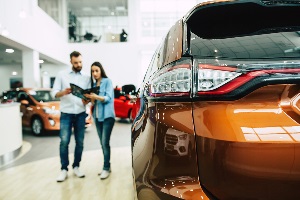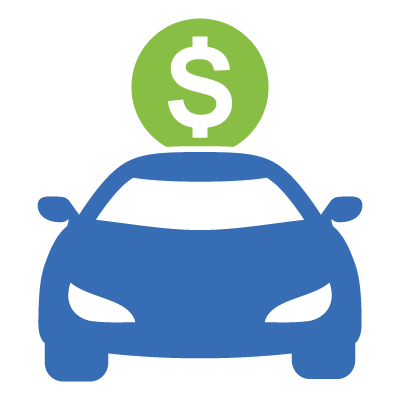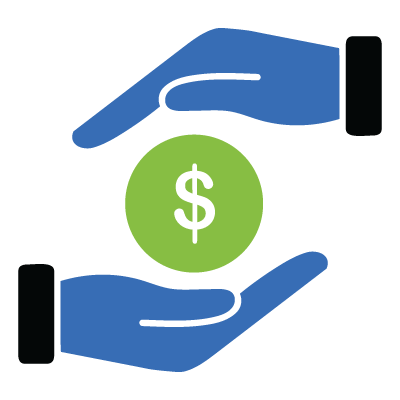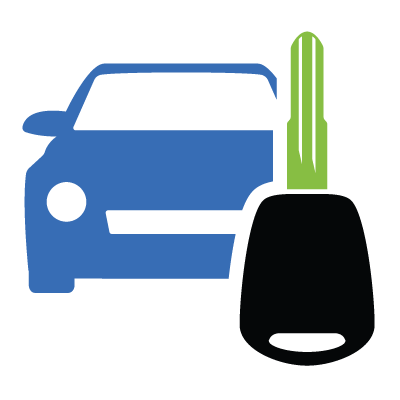Money Smarts Blog
Should I lease or buy my next vehicle?
Jun 15, 2021 || Amy Smith, Consumer Loan Underwriting Manager

We can all probably recite that one car commercial we hear over and over again on TV and radio offering LOW, LOW, PRICES, on a brand new vehicle when you lease. Maybe you’ve even considered taking that offer. However, even though
leasing and buying a vehicle may look similar, they’re very different. So, before you lease or purchase that (insert TV voice) “shiny new car!”, make sure it’s the right move for you. A helpful place to start is knowing what
exactly a lease is and the difference between leasing and buying.
What’s a lease?
Leasing a car is a lot like renting an apartment. First there’s your security deposit, which is equal to your first month’s payment.
And if you return the car in the same condition as you received it, you get your security deposit back. Pretty simple.
The payment on a lease is usually smaller than the payment on an auto loan if you were to buy the car instead. This is because you’re only paying the depreciation of value on the car and interest for the length of your loan. Basically, you pay the
difference of what the car was worth when you started the lease and how much it will be worth when your lease is over.
Let’s break that down a bit further. Say you lease a car that’s $25,000 (a Nissan Altima, just for fun).
Its expected value at the end of the lease is $10,000 and your interest rate is 3.2%. You’re responsible for the $15,000 difference plus 3.2% interest, which equals a total of $15,480. When you return the leased car, you can either choose to
lease a new car or buy the car you’ve been driving. In this case, any money you’ve already paid counts toward the cost of the vehicle.
How exactly is leasing different from buying?

When you buy, you are responsible for paying for the total value of the vehicle. Want that Nissan Altima? You’ll need to pay $25,000 for it. Because the total cost of buying a new vehicle is more than the depreciation you’d pay on a lease,
the monthly payment is usually higher.

Unlike leasing a vehicle, you don’t need a security deposit, but you’ll probably still need to pay some money up front if you plan to get a loan. Most lenders won’t loan you 100% of the vehicle’s value, so you’ll need to
make a down payment. This can be cash, or you can trade-in your old vehicle. Leasing comes with some maintenance perks. When you lease a car, your vehicle is under warranty. Which means any car maintenance you need is covered by the dealership. If
you own the car, it’s your responsibility to pay for any needed maintenance. This includes oil changes, tire rotations and your 50,000 miles, 100,000 miles and 150,000 miles tune ups.

Speaking of miles, leasing comes with some restrictions on how much you drive the car. Leases typically come with a mileage restriction. Basically, you aren’t allowed to drive more than 36,000 miles per year that you lease the vehicle.
If you go over the mileage limit, you can expect to pay a penalty. Usually a 15-25 cent per mile fee is
due upon returning the vehicle. We’ve all learned how unpredictable life can be recently. Leasing comes with less flexibility than owning, meaning there are likely fees to terminate your lease.
Keep that in mind when making your decision.

Remember that security deposit we talked about with leasing? If you have kids or love taking road trips, leasing a vehicle might come with some extra expenses for you. The wear and tear fees for returning the vehicle in a worse condition than when you
started the lease can be hefty, and those mileage fees are nothing to laugh at either.

If you choose to buy your car instead of lease, you get the major perk of ownership. Which means you can put as many miles on it as you want, and once the loan is paid off you’re free of monthly payments and can do what you like with your car. Drive it for another 20 years, hand it down to your teenager, or trade it in for something new. The options are endless because it belongs to you.
So what’s the best option?
If you lease a car you have to give it back to the dealership when the lease is over or start the process of buying it. If you’re the kind of person who gets a new car every couple years because of the look, technology, safety features, or all of the above, this might be the best option for you. But if you’re the kind of person who drives a car a long distance and for a long time, you might find you’re better suited to buy the vehicle outright.
Deciding to purchase or lease a vehicle is a big decision. Hopefully after learning all the ins and outs of leasing a car you have a better idea of what’s right for you. If purchasing a vehicle is the right option, check out our auto loans and drive off the lot with that (cue TV voice) “shiny new car!”